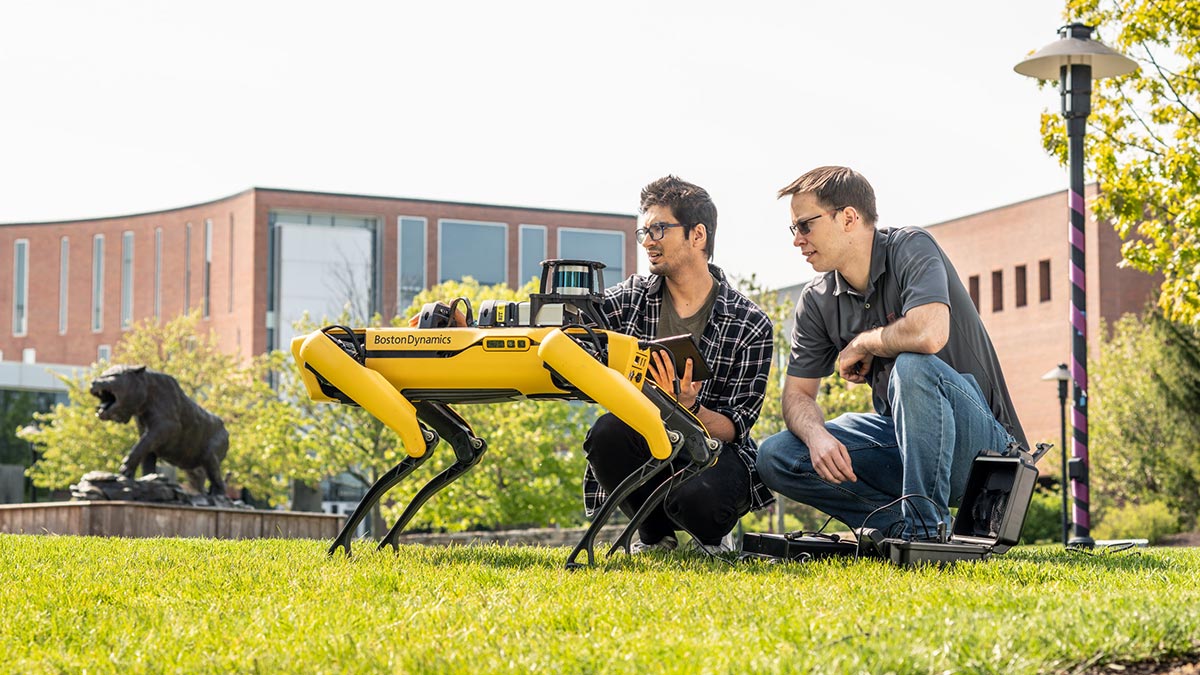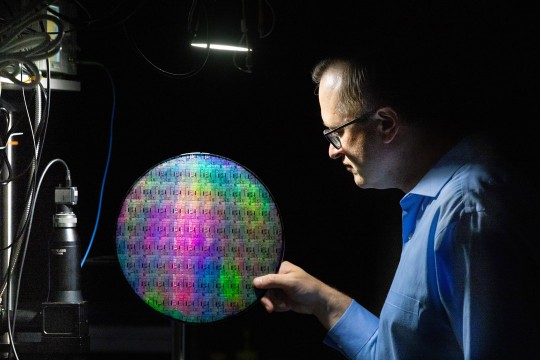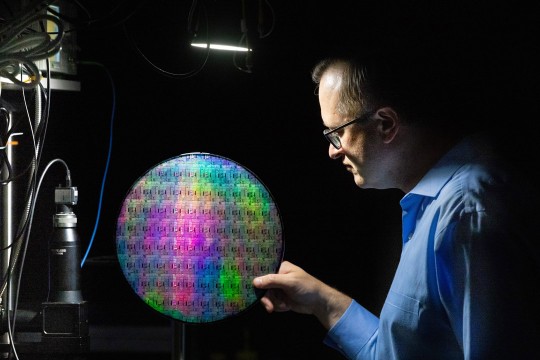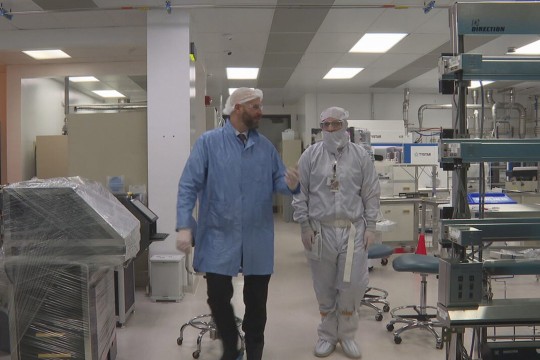Department of Electrical and Microelectronic Engineering

Department of
Electrical and Microelectronic Engineering
- RIT/
- College of Engineering/
- Academics/
- Departments/
- Electrical and Microelectronic Engineering
Contact
Jayanti Venkataraman, Associate Department Head, Electrical Engineering Programs
585-475-2143, jnveee@rit.edu
Karl Hirschman, Associate Department Head, Microelectronic Engineering Programs
585-475-5130, kdhemc@rit.edu
Mark Indovina, Director of Outreach and Facilities
585-475-6614, maieee@rit.edu
Overview
The department of Electrical and Microelectronic Engineering (EME) offers bachelor’s, master’s and doctoral degrees that combine the rigor of theory with the flexibility of engineering practice. From technology development to technology application, the innovations of electrical and microelectronic engineers are shaping our future.
The department’s mission is to establish its electrical and microelectronic engineering programs among the top programs in the world by providing high quality, inclusive education that cultivates intellectual curiosity. Our curricula apply mathematical and scientific foundations to the varied electrical and microelectronic disciplines in order to train high quality, independent thinking engineers and researchers that make measurable impacts on the world.
Electrical Engineering
Electrical engineering is a discipline concerned with the study, design, and application of equipment, devices, and systems that use electricity, magnetism, and electromagnetism. The discipline is divided into multiple focus areas, including: Analog and Mixed-Signal Electronics, Electronic Devices and Components, Digital and Computer Systems, Electromagnetics and Waves, Mechatronics, Electrical Power Systems, Telecommunications, Signal Processing, Machine Learning, Artificial Intelligence, Robotics. As a result, electrical engineers work in a wide variety of industries and are required to possess skills such as device modeling, circuit design, system architecture, algorithm development, and project management. Electrical engineers intensively use computer assisted design tools and methods, and test equipment.
Microelectronic Engineering
Microelectronic engineering focuses on the study, design, and fabrication of very small electronic devices and components (micrometer scale or below). These are semiconductor and photonic devices that impact virtually every aspect of human life, from communication, entertainment, and transportation, to health, solid-state lighting, and solar cells. There is an ever-increasing need for talented engineers that not only understand the design of these devices but can direct and optimize their fabrication. Integrated nanoelectronic and microelectronic circuits and sensors drive our global economy, increase our productivity, and help improve our quality of life. Learn more about semiconductor chips at RIT
Accreditation
The BS degrees in electrical engineering and microelectronic engineering are accredited by the Engineering Accreditation Commission of ABET, www.abet.org, which certifies that they meet the highest quality standards of the corresponding professions and that the graduates are well prepared to enter a global workforce.
For Enrollment and Graduation Data, Program Educational Objectives, and Student Outcomes, please visit the college’s Accreditation page.
12
Undergraduate and graduate degree options
32
Faculty Members
12
Faculty Research Areas
Degree Programs
Undergraduate Degrees
RIT’s artificial intelligence option in electrical engineering provides you with the skills needed to design intelligent agents that can advance society.
Learn more about the Artificial Intelligence Option - Electrical Engineering BS programRIT’s clean and renewable energy option in electrical engineering will prepare you to develop and implement solutions that reduce, prevent, or mitigate serious environmental threats to our planet.
Learn more about the Clean and Renewable Energy Option - Electrical Engineering BS programRIT’s Computer Engineering option in Electrical Engineering BS will provide skills to ensure devices such as laptops, smartphones, autonomous cars, and cardiac pacemakers function efficiently.
Learn more about the Computer Engineering Option - Electrical Engineering BS programWith RIT’s electrical engineering BS, you’ll integrate science, tech, math, and hands-on skills into advanced electronics, robotics, and smart energy systems.
Learn more about the Electrical Engineering BS programDevelop an expertise in circuit design, automation, and modern integrated circuits as you study both analog and mixed signal circuits.
Learn more about the Integrated Electronics Certificate programRIT’s microelectronic engineering BS program combines an EE curriculum with semiconductor courses to master the materials, processes and devices in microchips.
Learn more about the Microelectronic Engineering BS programThe electrical engineering BS - microelectronics option provides semiconductor courses and clean room lab experience not typically found in undergrad electrical engineering programs.
Learn more about the Microelectronics Option - Electrical Engineering BS programRIT’s robotics option in electrical engineering BS provides you with the theoretical and practical skills required to design robots and robotic devices.
Learn more about the Robotics Option - Electrical Engineering BS programGraduate Degrees
The electrical and computer engineering Ph.D. gives engineers the tools to transform the world by leading trailblazing research that expands and creates knowledge.
Learn more about the Electrical and Computer Engineering Ph.D. programIn RIT’s electrical engineering master’s degree, you will engage in innovative research areas to solve industrial and business challenges.
Learn more about the Electrical Engineering MS programRIT's world-renowned microelectronic engineering MS equips students with the skills to design and optimize semiconductor and photonic devices for various industries.
Learn more about the Microelectronic Engineering MS programIn RIT's microsystems engineering Ph.D., you’ll conduct research in nano-engineering, design methods, and technologies for micro- and nano-scaled systems.
Learn more about the Microsystems Engineering Ph.D. programMinors and Immersions
Electrical engineering encompasses disciplines such as electronics, communication, control, digital systems, and signal/image processing. An electrical engineering minor provides a foundation to explore specialized material in electrical engineering, and provides students from other engineering or non-engineering disciplines an introduction to the wide-ranging content of the electrical engineering major.
Learn more about the Electrical Engineering Minor programThe microelectronic engineering minor provides basic integrated circuit fabrication skills to students from science and other engineering related disciplines whose career path may involve the semiconductor industry. RIT has one of the finest cleanrooms in the world specializing in undergraduate microelectronic education. This minor enables students to utilize these state-of-the-art facilities while they develop the skills they need for success in the industry.
Learn more about the Microelectronic Engineering Minor programResearch
The faculty and students in the electrical and microelectronic engineering department conduct research in a wide range of interdisciplinary fields including, but not limited to: digital and computer systems, signal processing, electromagnetics, power and energy systems, robotics, telecommunications, machine learning, analog and mixed-signal electronics, mechatronics, microelectromechanical systems, semiconductor devices, advanced integrated circuit manufacturing. Research is externally supported by an array of federal, state, and industry sponsors, such as the National Science Foundation, the US Air Force, and the US Navy. Faculty offer research mentorship to BS, MS, and Ph.D. students.
Research Areas
Latest News
-
February 13, 2026

NIST awards $2M to UR, RIT to expand Rochester Quantum Network
Rochester Business Journal speaks to Stefan Preble, Bausch and Lomb Professor and Ph.D. program director in the Department of Microelectronic Engineering, about how the funds will support quantum development.
-
February 13, 2026

URochester, RIT receive $2 million in tech funds
Rochester Beacon discusses the impact the funds will have on the further development of an experimental network connecting the campuses, speaking to Stefan Preble, Bausch and Lomb Professor and Ph.D. program director in the Department of Microelectronic Engineering.
-
January 26, 2026

RIT hopeful Micron can be talent pipeline to hire 'well-suited' students
WHAM-TV speaks to Karl Hirschman, associate department head in the Department of Electrical and Microelectronic Engineering, about the ever-growing needs of the U.S. semiconductor industry.
Featured Work and Profiles
-
Engineering Alumnus Influences National Semiconductor Research Initiatives
Scott Bukofsky '92 brings extensive experience to the U.S. Department of Commerce’s National Semiconductor Technology Center.
Read More about Engineering Alumnus Influences National Semiconductor Research Initiatives -
Alumna Harshala Patil leads semiconductor development at Samsung
Alumna Harshala Patil ’15 (electrical and microelectronic engineering) is leading semiconductor development and manufacturing initiatives at Samsung Austin, one of the top three global computer chip...
Read More about Alumna Harshala Patil leads semiconductor development at Samsung -
Amazon Exec Empowers Next-Gen Cybersecurity Talent
Amazon executive and RIT alum Arthur Deane ’08 (electrical engineering) is helping cybersecurity students unlock opportunities in the rapidly growing tech sector.
Read More about Amazon Exec Empowers Next-Gen Cybersecurity Talent -
NSF Honors Bing Yan for Breakthrough Smart Grid Work
RIT’s Bing Yan has been awarded a 2024 NSF CAREER Award for her research aimed at improving smart grid management through better integration of renewable energy resources and enhanced storage capacity...
Read More about NSF Honors Bing Yan for Breakthrough Smart Grid Work -
RIT Research Minute: Photonic Microchips
Stefan Preble Professor Stefan Preble and his research team are developing the next generation of photonic chips to improve fields like quantum computing and health care.
Read More about RIT Research Minute: Photonic Microchips -
From Classroom to Career: Elissa Sainthil's Transformative Co-op Experience at Advanced Energy
Elissa Sainthil gained valuable experience during her co-op at Advanced Energy where she worked on UltraVolt products.
Read More about From Classroom to Career: Elissa Sainthil's Transformative Co-op Experience at Advanced Energy
Student Clubs and Organizations
Numerous clubs and organizations provide opportunities for electrical and microelectronic engineering students to engage in dynamic projects that apply the skills they learn in the classroom to real-world applications of engineering theory and practice.
Amateur Radio Club
Baja SAE
FIRST Robotics Club
Formula One SAE Racing Team
Our award-winning SAE team, builds a car from the ground up every year. Purchasing only the engine block, tires, and bulk materials, it is entirely designed and constructed by our students to compete in national and international competitions.
Multidisciplinary Robotics Club
Aero Design Team
The student chapter of the Aero Design Team is dedicated to promoting careers and opportunities in the aerospace industry.
Electric Vehicle Club
Hot Wheels Racing Team
National Society of Black Engineers
The student chapter of the National Society of Black Engineers is dedicated to the retention, recruitment, and successful graduation of its members.
Society of Hispanic Professional Engineers
The Society of Hispanic Professional Engineers is an association of professionals and students in engineering, science, technology, business, and other related disciplines at RIT. SHPE’s aim is to identify and promote professional growth opportunities for Hispanic students.
Society of Women Engineers
The Society of Women Engineers at RIT is a student-run organization that organizes functions each semester, such as guest speakers, high school outreach, community activities, tours, social events, and events with other student organizations. The RIT chapter is strongly committed to the encouragement of women in pursuing a career in engineering or related fields.
RIT Student Chapter of Engineers for a Sustainable World
Society of Automotive Engineers and FSAE Competition Team
The purpose of the RIT Society of Automotive Engineers is to give students the opportunity to meet with senior engineers in industry and provide students a chance to apply their classroom knowledge in various projects.
Conferences and Short Courses
Annual Microelectronic Engineering Conference at RIT
The Annual Microelectronic Engineering Conference (AMEC) at RIT started in 1983 as a means of bringing together students, faculty, alumni, and industry interested in microelectronic engineering.
Learn More
Short Courses
Short courses are comprehensive, hands-on, educational experiences intended for individuals seeking a better understanding of the overall theory and practice of microelectronic engineering.
Learn More
Student Resources
The Electrical and Microelectronic Engineering Department offers a variety of resources for our students that vary from academic support to handbooks and more. Visit our Student Resources page for more information.





































